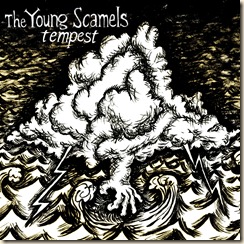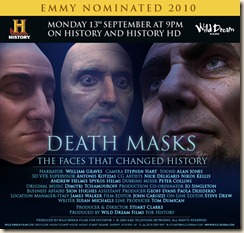A funny thing happened on the way to this review. I got email from Tor books, who are known in the scifi/fantasy world. So I thought it was a press release and didn’t really pay attention – until I noticed that Shakespeare was mentioned. Then I realized it wasn’t a mass mailing, it was addressed directly to me at my Shakespeare Geek address. Turns out that this particular book was written by a Shakespeare professor and they thought I might like a review copy. Sure!
Will Power is the second in a series from author A.J. Hartley, Distinguished Professor of Shakespeare at the University of North Carolina. I felt a little weird jumping into the series in the middle, but really if you think about the fantasy genre the odds are against you on that one (for any N book series, you’ve got an N-1 out of N chance of finding a book other than book 1).
is the second in a series from author A.J. Hartley, Distinguished Professor of Shakespeare at the University of North Carolina. I felt a little weird jumping into the series in the middle, but really if you think about the fantasy genre the odds are against you on that one (for any N book series, you’ve got an N-1 out of N chance of finding a book other than book 1).
This book tells the continuing story of our merry band of adventurers, including one Will Hawthorne, playwright. You know the type – generally cowardly sort who only came along to hang out on the sidelines and partake of the treasure, and maybe some beer and wenches. And, naturally, he’s the one who inevitably saves his stronger and braver friends when they get into trouble.
In Will Power, it doesn’t take long before the group is mysteriously transported into a strange new land, and split up in the process. They soon find themselves unwelcome guests right in the middle of a war between the Fair Folk and the Goblins. But is all as it seems? His companions Orgos and Mithos have been captured by goblins, Renthrette and Garnet have joined the Fair Folk, Lisha is lost somewhere, and something just doesn’t feel right to Hawthorne.
What happens next? There are enough twists and turns and clever devices that I can honestly say I didn’t predict where the story would go. The story ends on a satisfactory note while simultaneously opening up a door for the next book in the series. This author knows how to write fantasy. :)
What about the Shakespeare, you’re asking? Me too. There’s a funny scene early on when Hawthorne stumbles across what he thinks is a tavern, and introduces himself by reciting something of a mini-ballad … in iambic pentameter. Not bad.
Later, while roaming around the city of the Fair Folk, we learn that they have a library, and that library has a drama section. Hawthorne makes a beeline for this literary oasis, breaking down doors (seriously) to get to it. I think some of the literature geeks in the audience can appreciate what that feels like. There may be a goblin war raging outside the city walls, but if you need me I’ll be curled up with a good book.
There are also plenty of opportunities to do the whole “act like somebody you’re not” thing for our hero. He has to act like he knows what he’s doing half the time, after all. But none of that is really Shakespeare. Nobody “puts on a show.”
The press release suggests “a magical world which very closely resembles that of the Elizabethan Era,” and I’m wondering if that was a comment from the first book. Because other than starting the book out in a tavern and making regular comments about the poor quality of the beer, I can’t really see where the Elizabethan thing comes in. Oh, well, I take that back – the city of the Fair Folk is populated with courtiers who spend their days drenching each other in over-the-top metaphor (“My Lord, embers and smoldering leaves produce a smoke most bitter and unwholesome to the senses, yet the heat from whence it rises is but a poor and mean thing at which one might not even warm one’s hands. The heart of a furnace burns pure and hot, consuming all and leaving little there to smoke withal. So my love for Johanna, like the core of the forge, blazes with white, undying passion, while yours for Beatrice, I fear, so cool and, doused with overlong laments, smokes merely.”) I always thought this behavior was more Victorian than Elizabethan, but I’m not a history buff. What it reminded me of was a Monty Python version of Oscar Wilde.
It did not go unnoticed, either, that the author drops in names like Beatrice as necessary – one of the others tells the story of a young lady enamored with a certain young shepard named Corin, as well. Both are direct, if insubstantial, Shakespeare references.
Will Power was an entertaining fantasy book. I may have started out assuming that it was going to fit the standard form where the ‘weakling’ in an otherwise stalwart band of adventurers eventually turns out to save the day, but in the end there was enough originality that I was impressed with how it all went down. I would have liked more Shakespeare, but that’s not a fair measure – I always want more Shakespeare, up to the point where it *is* Shakespeare. :) I’ll be curious to see how the third book goes, and how much Shakespeare comes into it.











